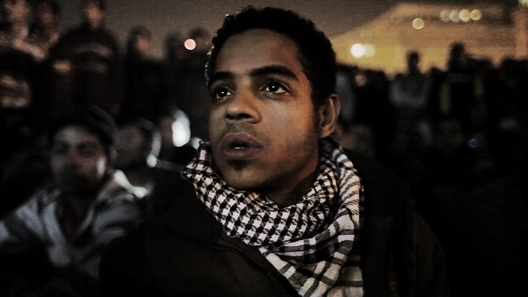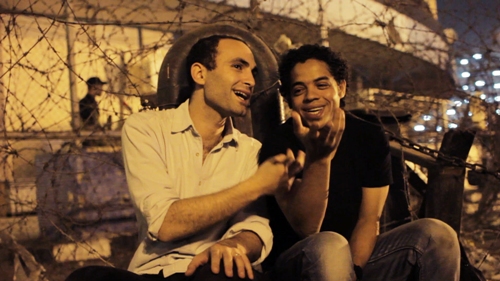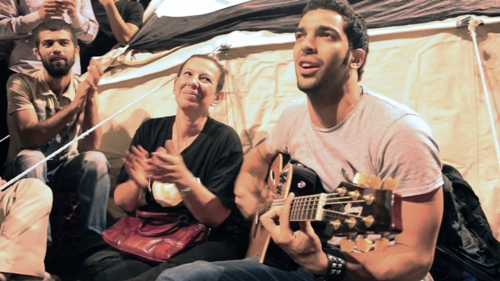 From its opening scene of masses chanting “The people want the downfall of the regime” in Tahrir in January 2011, you can tell that The Square will not be an easy movie to watch. From the widely-publicized birds-eye view of Tahrir, director Jehane Noujaim’s The Square zooms in on the lives of five very different revolutionaries, united by one cause.
From its opening scene of masses chanting “The people want the downfall of the regime” in Tahrir in January 2011, you can tell that The Square will not be an easy movie to watch. From the widely-publicized birds-eye view of Tahrir, director Jehane Noujaim’s The Square zooms in on the lives of five very different revolutionaries, united by one cause.
A masterful narrator, Ahmed Hassan takes us on a journey that many around the world have viewed only through the eyes of journalists, and rarely through the eyes of those who spent eighteen days camped out in Tahrir in 2011. Through him, we get to know Khalid Abdalla, the Egyptian-English actor born to a prominent anti-regime activist father and grandfather; Magdy Ashour, the Muslim Brotherhood member who, like many of his brethren, faced harassment at the hands of Egyptian authorities; Aida al-Kashef, an independent filmmaker; and Rami Essam, who shot to fame with his impromptu songs sung in Tahrir, earning him the title of singer of the revolution. These individuals are not only the focus of the film, but at many times its videographers, with much of the footage used taken by them and others, either from within Tahrir or from apartments overlooking the square.
| “I just decided to walk in the middle of the road; no more walking by the sidelines.” —Ahmed Hassan |
The vast differences between these individuals, none of whom claim a leading role in the revolution but who reflect many aspects of the generation that brought it about, make The Square a compelling film. Ahmed, our narrator, is the epitome of the ‘Egyptian.’ Growing up in a poor Cairo neighborhood, he sold lemons at traffic stops to pay his school tuition. He narrates the journey that he, along with many Egyptians, went through: from the excitement and hope of the first days of the square in January 2011 to the elation of February 11 when Mubarak stepped down, all the way through the parliamentary and presidential elections, the writing of the constitution, and the reluctant return to the square to demand Morsi’s removal; with all the violent heart-rending events that ensued in between.
At one point we see him walking in the middle of the street, distraught over how the revolution has turned out. He says, “I just decided to walk in the middle of the road; no more walking by the sidelines.” After Morsi’s many failures to fulfill the aspirations of the revolutionaries, we see Ahmed confront a number of Muslim Brotherhood supporters as they celebrate in Tahrir; his words to them reflect the feelings of many Egyptians at the time, that the Brotherhood stole the revolution.

Khalid is one of the first people Ahmed befriends during his first eighteen days in Tahrir. The Egyptian-English actor who played a starring role in United 93, represents Egypt’s well-educated, comfortable elite. Khalid was born to a family of political activists—with both his father and grandfather were speaking out against the Egyptian regime—and his posh English accent and Western worldview reflect a segment of Egypt that was as much a part of the revolution. Returning to Egypt as the protests against ousted president Hosni Mubarak are at their peak, Khalid’s online calls with his father in the UK show his excitement, anxiety, passion, and fear at different times. His concern that the Brotherhood will commandeer the revolution is at the heart of many debates and interviews caught on camera. He is also seen organizing ’Tahrir Cinema,’ an independent movement showcasing rights violations at the hands of the military. Khalid’s role in the film, and the uprising, is one of a citizen journalist. He says, “The battle isn’t just rocks and stones…the battle is in the images…the battle is in the story.”
A third, and seemingly unlikely friend, is Magdy. Magdy is a member of the Muslim Brotherhood, and in sharing his story Noujaim does a spectacular job of showing the human side to the Brotherhood many seem to readily dismiss. In the air of extreme polarization in Egypt, and the demonization of the Brotherhood in the wake of Morsi’s ouster, The Square provides an important reminder that all involved in this transitional phase have at least one thing in common. They are all Egyptian.
| “The battle isn’t just rocks and stones…the battle is in the images…the battle is in the story.” —Khalid Abdalla |
After the Itihadeya clashes between pro- and anti-Morsi protesters, in which members of the Brotherhood attacked their opponents, an interview with Magdy shows the extent of his own inner conflict. Magdy’s son, who was present for the interview, joined his Brotherhood friends in attacking the Itihadeya sit-in. Incredulous, Magdy asks him who he was attacking: was he attacking his father’s friends, Khalid and Ahmed, or others like them, including Pierre, the owner of an apartment in Tahrir where friends and journalists often congregated, overlooking the crowds in the square? This interview reveals the depth of the struggle Magdy faces: between following orders coming down from within the upper ranks of the Brotherhood, or honoring the bonds formed in Tahrir, a place, in hindsight, that seems nothing more than a distant utopia. In a phone call with Magdy shortly before the violent dispersal of the pro-Morsi sit-ins in August, Ahmed tearfully recalls their friendship and their time together in Tahrir. It is, again, a rare and important moment of humanization among Egyptians, one that appears in contrast with the dismissive reaction of many Egyptians to the killing of hundreds of protesters in the Raba’a al-Adaweya and al-Nahda sit-ins.

Aida and Ramy, the two other people featured in The Square, appear less than Ahmed, Khalid, and Magdy. Aida is one of many women who were an integral part of Egypt’s uprising, and the footage she shot in many of the clashes is a symbol of the courage many Egyptian women displayed in the face of the police, army, and opposing protesters. Ramy, who was often seen singing on the stage in Tahrir, was viciously attacked by army personnel in March 2011, as most Egyptians still reveled in a honeymoon period with the army, seeing them as the saviors of the revolution. His filmed testimony is a reminder of the armed forces’ transgressions during their year and half in power.
While Egypt’s story, featured in The Square has been a mainstay in international media for the past three years, the film shows a different side: focusing on the humans behind the revolution. The struggles of these individuals are the same struggles facing countless Egyptians. This film is a must-watch for anyone who is looking to understand why Egyptians stood up to Mubarak, SCAF, and Morsi, and why they continue to stand up today to anyone who seeks to deny them the freedom, bread, and social justice they have been calling for since January 2011.
Amir Beshay completed his bacherlor’s degree in Computer Engineering at the Germany University in Cairo. He is currently enrolled in New York University’s Center for Urban Studies and Progress where he is completing his master’s in Applied Urban Science and Informatics.
Image: Photo: . Egyptian activist Ahmed Hassan in Jehane Noujaim’s documentary The Square. Courtesy of Noujaim Films
